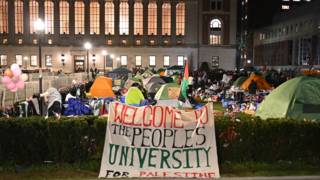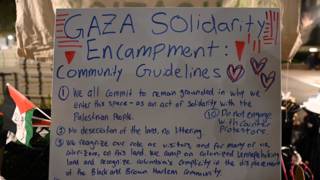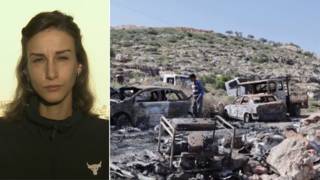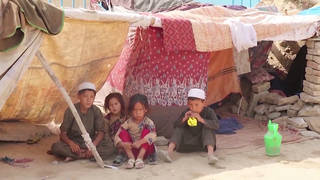
Related
Guests
- Isabelle Moussard Carlsenhead of the United Nations Office for the Coordination of Humanitarian Affairs in Afghanistan.
The United Nations warns Afghanistan is on the brink of a humanitarian catastrophe, as the country faces political upheaval, a worsening economic crisis and a devastating drought. Humanitarian groups are vowing to keep working in Afghanistan following the Taliban takeover, but they are facing new hurdles, from working under Taliban rule to concerns about the international community providing much needed foreign aid to restrictions at the Kabul airport. “Today in Afghanistan, we’re seeing a potential humanitarian catastrophe,” says Isabelle Moussard Carlsen, head of the U.N. Office for the Coordination of Humanitarian Affairs in Afghanistan. “Half of the population is in need of humanitarian aid.”
Transcript
AMY GOODMAN: We begin today’s show in Afghanistan, as the United States flies out nearly 60,000 people, and counting, from the Kabul airport. The United Nations is warning Afghanistan is on the brink of a humanitarian catastrophe, as the nation faces political upheaval, a worsening economic crisis and a devastating drought. The World Health Organization says about one-half of Afghanistan’s population, including nearly 10 million children, already need humanitarian assistance, and the numbers are expected to soar. More than half of all children under the age of 5 are malnourished. The U.N. estimates nearly 400,000 Afghans have been forced from their homes so far this year. This is on top of the nearly 3 million Afghans who were already internally displaced at the end of 2020. As tens of thousands of Afghans attempt to flee the country by land or air, the United Nations and many humanitarian groups are vowing to keep working in Afghanistan following the takeover of the Taliban. This is U.N. Secretary-General António Guterres speaking last week.
SECRETARY-GENERAL ANTÓNIO GUTERRES: At this grave hour, I urge all parties, especially the Taliban, to exercise utmost restraint to protect lives and to ensure that humanitarian needs can be met. Conflict has forced hundreds of thousands from their homes. The capital city has seen a huge influx of internally displaced persons from provinces around the country, where they felt insecure or fled during fighting. …
The humanitarian crisis in Afghanistan affects 18 million people, fully half of the country’s population. It is vital that basic services continue to be provided. In a statement issued yesterday, the Taliban said they would work with existing institutions. It is crucial that civil servants’ salaries continue to be paid, infrastructure is maintained, airports are reopened, and health and education services continue. The United Nations’ presence will adapt to the security situation, but, above all, we will stay and deliver in support of the Afghan people in their hour of need.
AMY GOODMAN: U.N. Secretary-General António Guterres. This all comes as Afghanistan is facing an economic crisis. The United States recently blocked the Taliban from $9.5 billion held by the Afghan government in U.S. banks. The International Monetary Fund has also suspended Afghanistan’s access to funds.
We go now to Kabul, where we’re joined by Isabelle Moussard Carlsen, head of the U.N. Humanitarian Office in Afghanistan.
Thanks so much for joining us. Why don’t we begin — we are seeing all over the world these images of thousands of people trying to flee Afghanistan at the airport. What we don’t see is the rest of Afghanistan. Can you tell us what’s happening?
ISABELLE MOUSSARD CARLSEN: Hi. Good morning. Thank you very much for having me.
Today in Afghanistan, we’re seeing a potential humanitarian catastrophe. Since the beginning of the year, we are facing a number of aggravating factors for the Afghan population. Half of the population is in need of humanitarian aid. We see half a million people displaced just this year. We have seen people displaced to urban centers, but we’ve also seen a pendulum of population movement fleeing the conflict and the intensity of the conflict and moving from one location to the next. We also are very concerned by prices that are increasing. And obviously, the two other really important factors that have been impacting the Afghan people are a very severe drought, as well as the economic impact of COVID-19.
AMY GOODMAN: So, can you respond to the United States blocking the Taliban from $9.5 billion that were held by the Afghan government in Afghanistan, as we said in the lede; the IMF also suspending Afghanistan’s access to funds; earlier today, the WHO, the World Health Organization, saying it’s been unable to fly 500 tons of medical supplies into Afghanistan due to restraints at the Kabul airport? Can you respond to all of this, the withholding of the funds?
ISABELLE MOUSSARD CARLSEN: So, as humanitarians, we have funding for a continued operation. It will be essential in the coming days and weeks that there is an important scale-up and fast-tracking of the humanitarian funding to allow the aid agency to continue saving lives and to deliver the very much needed essential services to the affected population. In our commitment to stay and deliver, it is really important that we have the ability and the funding to do so.
Today in Afghanistan, we have over 150 partners delivering aid. And since the beginning of the year, 8 million people have received aid. So, we need to scale up. We consider that 16 million people will be requiring aid this year in Afghanistan. And obviously, with the increase of fighting that we have seen, with the drought, with the winter coming very soon, we need to be able to continue ensuring that we are alongside the Afghan people and that they have access to all essential services.
AMY GOODMAN: I wanted to play a clip of Mary-Ellen McGroarty, the U.N.'s World Food Programme's country director from Afghanistan, warning of the horrendous consequences if international funding is halted.
MARY-ELLEN McGROARTY: There is an awful humanitarian crisis unfolding. I mean, a decision now to halt funding of any level to Afghanistan will have absolutely horrendous consequences. I mean, it’s 14 million people suffering hunger, over 2 million children suffering from malnutrition, incredible shelter needs, incredible health needs. If you see the trauma over the last couple of months because of the conflict, you know the needs are enormous. And in the last, really — and to scale back on funding now will only add to the instability and the desperation. You saw the desperation at the airport the other evening of people trying to leave. Multiply that across the country, if we cannot get life-saving assistance out to the people. It will not help Afghanistan at this time. So I would urge the international community to rethink if they are considering reducing the funding. Now is the time to act in Afghanistan. Now is the time the Afghan people need the international community to stand beside them.
AMY GOODMAN: So, that is your colleague in Afghanistan. You also sign everything with a hashtag that says “#StayAndDeliver.” Today there’s a virtual meeting of the wealthy countries, the G7, and, of course, President Biden is a part of that, will be addressing them. What do you think are the absolute priorities at this point that they should be addressing?
ISABELLE MOUSSARD CARLSEN: Well, the absolute priority is to remain alongside the Afghan people and to not abandon Afghanistan. It is absolutely essential that, as humanitarians, we are able to stay and deliver, and we are able to ensure that after 40 years of conflict, after a situation — in a situation of drought and food insecurity — my colleague from WFP has mentioned half of the children under 5 years old are suffering of acute severe malnutrition. All these elements, we need to be able to stay and respond and be alongside the Afghan people to do that.
AMY GOODMAN: This acute drought that’s taking place in Afghanistan, that has contributed to food insecurity and hunger — you tweeted, “This year, 1 in 3 people will be food insecure and half of all children acutely malnourished.” These are astounding figures.
ISABELLE MOUSSARD CARLSEN: They are. And it is a deadly combination of those factors that we have discussed — you know, the drought, the conflict, the displacement. When we talk to the people in those displacement sites and we ask them what are their priorities, what are their needs, we see that, you know, as a priority, they have shelter, they have access to clean water, they have access to healthcare and, obviously, access to food.
And I’ve been in different locations. Just a few weeks ago, we were able to travel, and I was in Kandahar hospital discussing with the head of pediatrics about the situation and what he was seeing in terms of the children being admitted in his unit. And he was telling me then that in the first six months of the year of 2021, he has seen the number of children admitted in the severely acute malnourished unit double compared to last year.
So, it’s very concrete for the people who are looking after these children. They are coming in in very large numbers to be treated. And we have to ensure that this treatment can continue, that there is no pipeline limitation, and that, as a humanitarian community, we can continue to address those needs.
AMY GOODMAN: We’re talking to Isabelle Moussard Carlsen, head of the, U.N. Humanitarian Office in Afghanistan. We’re speaking to her in Kabul. CBS News had a recent article, “How climate change helped strengthen the Taliban.” And you have these figures that even before the Taliban took over, at the beginning of 2021, half the population of Afghanistan already needed humanitarian assistance. So, right now we’ve gotten news that the head of the CIA has met with the Taliban. And, of course, those negotiations have been going on in Doha between the U.S. and the Taliban. Have you been meeting with the Taliban to work out how this is going to be, given that they are the now government, how the humanitarian crisis can be dealt with?
ISABELLE MOUSSARD CARLSEN: So, as humanitarians in this country and in other countries, we are speaking to all parties in presence, and we’re negotiating access to ensure that humanitarian aid can reach the most vulnerable people. And this is the way we are working. This is part of our mandate.
AMY GOODMAN: We’re seeing these harrowing pictures of thousands of people trying to get to the airport, surrounding the airport, this record — just at this point, I think the U.S. alone has flown out 58,000 people on nonstop flights. But there are thousands of Afghans who are fleeing over land through Iran and Turkey. But reports suggest Turkey is closing its borders and turning away refugees. What responsibility do neighboring countries have, and other countries, overall, to accepting refugees?
ISABELLE MOUSSARD CARLSEN: Refugees have rights and are protected. It is very important that they are accepted in the countries when required. But what we see mostly today in Afghanistan is internally displacement. And those internal displaced populations are very much at need and very much at risk, and they also need protection.
AMY GOODMAN: Well, I want to thank you so much for being with us, Isabelle Moussard Carlsen, head of the U.N. Humanitarian Office in Afghanistan, speaking to us from Kabul.
Coming up, as the FDA fully authorizes the Pfizer-BioNTech COVID-19 vaccine, Médecins Sans Frontières — that’s Doctors Without Borders — is calling on the companies to immediately share the vaccine technology with manufacturers in Africa, where less than 2% of the population is fully vaccinated. Stay with us.












Media Options